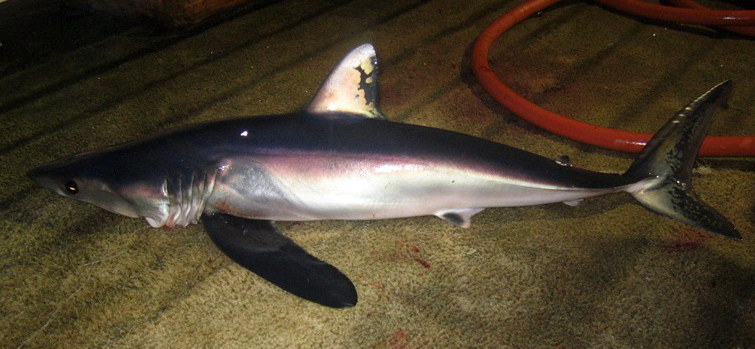Longfin Mako, Isurus paucus Guitart Manday 1966

A Longfin Mako, Isurus paucus. Source: NOAA Observer Program / Wikimedia Commons. License: Public Domain
A rare mako shark with very long broadly-tipped pectoral fins that are equal in length or longer than the head, a narrowly to bluntly pointed snout and a lunate caudal fin with a very long lower lobe. The Longfin Mako is dark blue above, white below, with dusky markings around the mouth on the underside of the snout.
The Longfin Mako is considered dangerous to humans.
Shark scientists scrambling to attach a satellite tag to a Longfin Mako near Cojimar in northern Cuba.
Longfin Mako, Isurus paucus Guitart Manday 1966
More Info
|
Distribution |
Known in Australia from off Geraldton to the North West Cape, Western Australia, and from north Queensland to off Port Stephens, New South Wales. Elsewhere, circumglobal in tropical and warm-temperate oceanic waters. |
|
Biology |
Little is known of the biology of this species. It is aplacental viviparous (ovoviviparous) with oophagy and uterine cannibalism. Once the largest embryos have used up their yolk sac, they feed on their smaller siblings and unfertilised eggs produced by the mother. Females give birth to two pups per litter. |
|
Fisheries |
Taken as bycatch in tropical pelagic longline tuna, swordfish and shark fisheries. Also taken in hook and line fisheries and caught in anchored gillnets. The species is usually finned and discarded at sea rather than being landed. |
|
Conservation |
IUCN REd List of Threatened Species: Vulnerable. In Australia, the Longfin Mako has been identified as a conservation value species in the South-west and Temperate East marine regions. |
|
Species Citation |
Isurus paucus Guitart Manday, 1966, Poeyana 15: 3, figs 1, 2a, 3a, c. Type locality: Cuba. |
|
Author |
Dianne J. Bray |
Longfin Mako, Isurus paucus Guitart Manday 1966
References
Compagno, L.J.V. 1984. FAO Species Catalogue. Sharks of the World. An annotated and illustrated catalogue of shark species known to date. Hexanchiformes to Lamniformes. FAO Fisheries Synopsis No. 125. Rome : FAO Vol. 4(1) pp. 1-249.
Compagno, L.J.V. 1998. Families Pseudocarchariidae, Alopiidae, Lamnidae. pp. 1268-1278 in Carpenter, K.E. & Niem, V.H. (eds). The Living Marine Resources of the Western Central Pacific. FAO Species Identification Guide for Fisheries Purposes. Rome : FAO Vol. 2 687-1396 pp.
Compagno, L.J.V. 2001. Sharks of the World. An annotated and illustrated catalogue of shark species known to date. Bullhead, mackerel and carpet sharks (Heterodontiformes, Lamniformes and Orectolobiformes). Rome : FAO, FAO Species Catalogue for Fisheries Purposes No. 1 Vol. 2 269 pp.
Compagno, L.J.V., Dando, M. & Fowler, S. 2005. A Field Guide to the Sharks of the World. London : Collins 368 pp.
Dulvy, N.K. & J.D. Reynolds. 1997. Evolutionary transitions among egg-laying, live-bearing and maternal inputs in sharks and rays. Proc. R. Soc. Lond., Ser. B Biol. Sci. 264: 1309-1315.
Gilmore, R.G. 1993. Reproductive biology of lamnoid sharks. Environmental Biology of Fishes 38: 95–114.
Guitart Manday, D. 1966. Nuevo nombre para una especie de tiburón del género Isurus (Elasmobranchii : Isuridae) de aguas Cubanas. Poeyana. Instituto de Zoología, Academia de Ciencias de Cuba A 15: 1-9 figs 1-3
Last, P.R. & Stevens, J.D. 2009. Sharks and Rays of Australia. Collingwood : CSIRO Publishing Australia 2, 550 pp.
Macbeth, W.G., Vandenberg, M. & Graham, K.J. 2008. Identifying Sharks and Rays; a Guide for Commercial Fishers. Sydney : New South Wales Department of Primary Industry 71 pp.
Michael, S.W. 1993. Reef sharks and rays of the world. A guide to their identification, behavior, and ecology. Sea Challengers, Monterey, California. 107 pp.
Pepperell, J. 2010. Fishes of the Open Ocean a Natural History & Illustrated Guide. Sydney : University of New South Wales Press Ltd 266 pp.
Reardon, M.B., Gerber, L. & Cavanagh, R.D. 2006. Isurus paucus. In: IUCN 2013. IUCN Red List of Threatened Species. Version 2013.2. <www.iucnredlist.org>. Downloaded on 02 September 2013.
Revill, A.T., J.W. Young & M. Lansdell. 2009. Stable isotope evidence for trophic groupings and bio-regionalization of predators and their prey in oceanic waters off eastern Australia. Marine Biology 156: 1241-53.
Rowling, K., A. Hegarty & M. Ives (Eds). 2010. Mako Sharks (Isurus spp.). In: Status of fisheries resources in NSW 2008/09. Pp 199-202. NSW Industry & Investment, Cronulla.
Stevens, J.D. & Scott, M. 1995. First record of the longfin mako, (Isurus paucus) from Australian waters. Memoirs of the Queensland Museum 38(2): 670.
White, W.T., P.R. Last, J.D. Stevens, G.K. Yearsley, Fahmi & Dharmadi. 2006. Economically important sharks and rays of Indonesia. [Hiu dan pari yang bernilai ekonomis penting di Indonesia]. Australian Centre for International Agricultural Research, Canberra, Australia.






